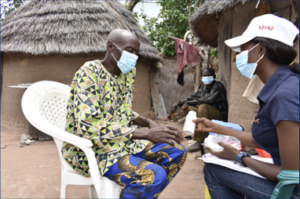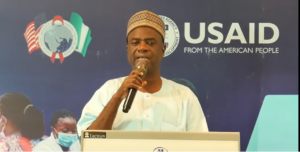
After five remarkable years of impactful collaboration and success, the Reaching Impact, Saturation and Epidemic Control (RISE) project in Nigeria, supported by U.S. President’s Emergency Plan for AIDS Relief (PEPFAR) and the U.S. Agency for International Development (USAID), came to a close in October 2024. RISE hosted a closeout event on 26th October, bringing together key stakeholders, partners and leaders in the global health community to reflect on the project’s achievements and discuss the path forward in sustaining HIV progress.
Since its launch in 2019, the RISE project has been more than just a health project—it has been a lifeline for individuals and families across five states of Nigeria: Adamawa, Akwa Ibom, Cross River, Niger and Taraba. Through its transformative work, it has restored hope to communities once devastated by HIV. By providing access to antiretroviral therapy and essential support services, RISE has helped people living with HIV thrive, enabling them to raise their children, contribute to their communities, and live fulfilling lives. One of the standout aspects of RISE’s approach has been the breadth of the programs engagement across all levels of the health system, from state and national level engagement to community and household level service delivery. These efforts not only improved health outcomes at the individual and community level, but also contributed to the Government of Nigeria’s objectives of sustainability and integration of primary health care and the HIV response.

Speaking at the event, the Commissioner of Health for Niger State, Dr. Bellow Tukur, said, “The true reflection of our success lies in the lives we have saved, in the families that are now thriving, and in the joy of children running around, playing freely. It’s because of this project’s success that these moments of happiness are possible today.”
Dolopo Ogundehin, team lead of Care and Treatment for USAID Nigeria seconded these sentiments, “the RISE project stands as a model for sustainability in the HIV response. As I reflect on the project’s successes, I see how it has strengthened the resilience of states, facilities and communities. The lessons learned from RISE will continue to shape and enhance future service delivery efforts.”

The USAID RISE project equipped Nigeria’s health workers with the knowledge and skills to deliver client centered, high-quality care. These health workers played a critical role in reducing stigma, raising awareness, and encouraging individuals to seek testing and treatment. RISE’s collaborative approach fostered a sense of ownership within the communities, helping to break down barriers and create a culture of care and support for people affected by HIV.
Pointing to the key role strong partnerships played in the project’s success, Kelly Curran, Global Project Director for RISE, said, “The RISE Nigeria project has shown that through collaboration, community involvement and an integrated approach, we can achieve our shared goal of ending HIV. We are grateful to our partners at USAID, PEPFAR and the Nigerian Ministry of Health for their support and leadership throughout the project. Together, we have made significant progress, and we look forward to building on this success.”

Through RISE Nigeria, over two million people have been tested for HIV across five states, reaching 53 local government areas and 103 health facilities. With 98% linkage to antiretroviral therapy and 97% viral load suppression, the project has played a critical role in scaling up HIV services and improving health outcomes across communities. The numbers speak to the remarkable impact made in strengthening health care systems and saving lives.
The following are some strategies that led to the project’s success:
- Increase access to services: RISE significantly extended HIV testing and treatment services, especially in underserved and remote communities. By integrating HIV care into primary health services, the project ensured that individuals received comprehensive care, improving diagnosis and treatment outcomes
- Enhance efficiency: The project streamlined HIV care services, allowing for better resource utilization and greater efficiency in delivering care, particularly in resource-limited settings. This translated into more lives being saved through a more effective and coordinated response.
- Strengthen health systems: RISE focused on building resilient health systems that could sustain the progress made in HIV response and address future health challenges. By involving communities in service delivery and strengthening primary health care, the project set the foundation for a sustainable health system.
Although the RISE Nigeria project has formally concluded, its impact will endure. The project leaves behind strengthened communities and health systems, and valuable knowledge that will shape Nigeria’s future response to HIV and other health challenges. The lessons learned and partnerships forged through RISE will continue to play a pivotal role in advancing health outcomes.
This short video captures some key moments from the close out event.
Read more
To explore the successes of RISE Nigeria and learn how integrated health services are helping to transform futures, see the following resources:
- Technical briefs: Read the RISE technical briefs, which highlight the many lessons learned in the course of implementing the RISE project in Nigeria
- Success stories: Read how RISE made a difference in both lives and health systems from the people who experienced the change themselves.






